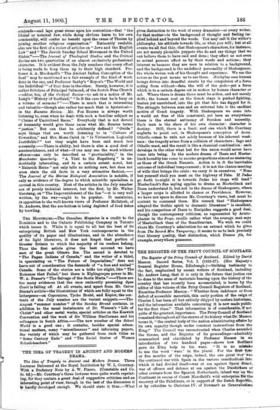THE IDEA OF TRAGEDY IN ANCIENT AND MODERN DRAMA.
The Idea of Tragedy in Ancient and Modern Drama. Three Lectures Delivered at the Royal Institution by W. L. Courtney. With a Prefatory Note by A. W. Pinero. (Constable and Co. Se. 6d.)—Mr. Courtney's three lectures were quite worth reprint- ing, for they contain a great deal of suggestive criticism and an interesting point of view, though in the last of the discourses it Is hardly developed enough. We should state it thus :—What gives distinction to the work of every dramatist—or every writer, for that matter—is the background of thought and feeling im- plied behind and beyond the words. You may call it the Writer's philosophy, his attitude towards life, or what you will ; but at all events we all feel this; that Shakespeare's characters, for instane.e, are not merely plausible puppets who do and say things that we can believe them to have said and done ; they affect us not even as actual persons affect us by their words and actions ; they interest us because they are seen in relation to a background, and the background is the undefined personality of Shakespeare, the whole woven web of his thought and experience. We see the actors as the poet means us to see them. 2Eschylus sees human beings driven into dreadful straits by the compulsion of a force acting from without—fate, the will of the gods—yet a force which is to a certain degree set in motion by human character or act. Where there is drama there must be action, and not merely drift ; the human soul on the Greek stage is pushed fighting, beaten yet unsubdned, into the pit that fate has digged for it. The struggle between man and an external fate is the cardinal motive of Greek tragedy. With Shakespeare we come into a world set free of this constraint, yet here as everywhere there is the eternal antinomy of freedom and necessity. Each man is the slave of his own character : character is destiny. Still, there is a limit, and one which Mr. Courtney neglects to point out, in Shakespeare's conception of doom. Othello comes to ruin not solely because of his inherent weak- ness: the tragedy arises from a collision of characters : lago and Othello meet, and the result is like a chemical combination : each develops in the other what but for the union would never have come into being. In the modern drama of Ibsen and Maeter- linck heredity has come to assume proportions almost as Menacing as those of the Greek Nemesis. Action is in it the inevitable outcome of individual temperament; it is not the chance meeting of wills that brings the crisis : we carry it in ourselves. "None but yourself shall you meet on the highway of Fate. If Judas go forth to-night it is towards Judas his steps will tend." Maeterlinck's fine saying applies to drama as Maeterlinck and Ibsen understand it, but not to the drama of Shakespeare, where a larger scope is allotted to chance or Providence. However, we have not space to discuss Mr. Courtney's views, but must be content to commend them. His remark that "Shakespeare adapted the Gothic spirit to dramatic literature" is excellent, and his comparison of Ibsen to Euripides suggests a good deal, though the contemporary criticism, as represented by Aristo- phones in the Frogs, recalls rather what the average man says of Maeterlinck than of the Scandinavian. We wish we could share Mr. Courtney's admiration for an extract which he gives from The Second Mrs. Tanqueray ; it seems to us to lack Precisely that literary quality, that distinction, which Dumas file, for example, everywhere possesses.


































 Previous page
Previous page